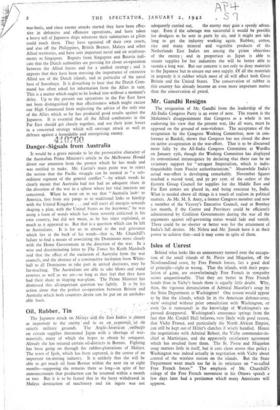Oil, Rubber, Tin
The Japanese attack on,Malaia • anif, tits East Indies is almost as important to the enemy and to us op., econornie...Va on
strictly military grounds. The Anglo-Arn Cricark on certain supplies threatened Japan with •shortage of war- materials, many of which she hopes to obtain by conquest. Already she has secured certain oil-districts in Borneo. Fighting has been going on through the rubber-plantations of Malaya. The town of Ipoh, which has been captured, is the centre of an important tin-mining industry. It is unlikely that she will be able to get much oil from Borneo within the next six or eight months—supposing she remains there so long—in spite of her announcements that production can be resumed within a month or two. But it is to be feared that in the hasty withdrawal in Malaya destruction of machinery and tin ingots was not adequately carried out, the enemy may gain a speedy advan- tage. Even if the sabotage was successful it would be possible for dredgers to be sent in parts by air, and it might pot take long to get the industry working again. Rubber, cotton, rice and many mineral and vegetable products of the Netherlands East Indies are among the prime objectives of the enemy ; and in proportion as Japan is able to secure supplies for her industries she will be better able to sustain a long war. But our concern is not only to deny materials to the Japanese but to ensure our own supply. Of all the materials in jeopardy it is rubber which most of all will affect both Great Britain and the United States. The conservation of rubber in this country has already become an even more important matter than the conservation of. petrol.


























 Previous page
Previous page